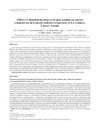Identificador persistente para citar o vincular este elemento:
https://accedacris.ulpgc.es/handle/10553/46892
| Título: | Effects of abandoning long-term goat grazing on species composition and species richness of pastures at La Gomera, Canary Islands | Otros títulos: | Efectos a largo plazo del abandono del pastoreo de cabras en la composición y riqueza de especies en los pastizales de La Gomera,Islas Canarias | Autores/as: | Arevalo, J. R. de Nascimento, L. Fernandez-Lugo, S. Saro, I. Camacho, A. Mata, J. Bermejo, L. |
Clasificación UNESCO: | 310510 Dinámica de las poblaciones | Palabras clave: | Detrended correspondence analysis Plant community Rarefaction Sustainability |
Fecha de publicación: | 2011 | Editor/a: | 1695-971X | Publicación seriada: | Spanish Journal of Agricultural Research | Resumen: | Goat grazing management is a powerful ecological force structuring plant communities which effects are highly different depending on factors such as climatic conditions, grazing intensity, type of plant community, etc. Pastures in the Canary Islands have important heritage, socioeconomic and landscape values because they are the remains of traditional livestock management and a key element of local economy. An experimental study of goat grazing exclusion has been carried out in an area of La Gomera Island to determine the main effects of grazing abandonment on species richness and species composition. The species composition of La Gomera pastures is more sensitive to grazing than to climatic variability, though effects in the species richness in relation to grazing were not detected. Because the pasture origin in this area involved artificial, removing of non useful plants in order to provide land for agriculture more than 300 years ago, and using it for pastures around 80 years ago, the sustainable use has maintained this rich plant community. Grazing abandonment can have a negative effect on the pastures’ diversity, as grazing has been a strong force in the maintenance of certain species. Public promotion of this primary activity is suggested to allow the continuation with minimal effects on the vegetation composition. This will help to conserve the high diversity of this area and the promotion of natural values as well as traditional and sustainable human activities. | URI: | https://accedacris.ulpgc.es/handle/10553/46892 | ISSN: | 1695-971X | DOI: | 10.5424/sjar/20110901-076-10 | Fuente: | Spanish Journal Of Agricultural Research [ISSN 1695-971X], v. 9 (1), p. 113-123 |
| Colección: | Artículos |
Citas SCOPUSTM
11
actualizado el 08-jun-2025
Citas de WEB OF SCIENCETM
Citations
9
actualizado el 25-feb-2024
Visitas
109
actualizado el 20-jul-2024
Descargas
126
actualizado el 20-jul-2024
Google ScholarTM
Verifica
Altmetric
Comparte
Exporta metadatos
Los elementos en ULPGC accedaCRIS están protegidos por derechos de autor con todos los derechos reservados, a menos que se indique lo contrario.
